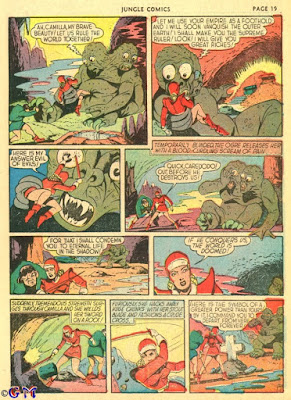Reader YBY wrote in the comments-section of this post:
I always figured the people who worked [at the Journal] were true believers in the whole "comics should be grown-up and complex" view.
As it happens, some ruminations on my experiences with the Journal fit in with another topic, so here goes.
On the general subject of making comics grown-up, the Journal didn’t start out with that high-toned ambition when the magazine began in 1976. In terms of content, the early Journal celebrated and criticized the same topics that engaged the greater part of comics fandom: genre-work from the major publishers and old fandom-favorites like EC Comics and the Carl Barks ducks. The Journal wasn’t the first fanzine to have couched its criticisms in a more intellectual tone, but Gary Groth succeeded in finding an assortment of writers who shared his waspish view of the medium-- including me-- which may have only been possible because mainstream fans had become more venturesome in their tastes in the early 1970s. At some point, the news section of the magazine became more adversarial toward the big companies (and some smaller ones), and that adversarial nature made the Journal notorious for its focus on controversial issues. Nevertheless, despite some of Groth’s later pronouncements, the Journal was still a fanzine. For what I remember as a full year, the magazine’s subscription page featured a still from the then-current STAR WARS hit, in which the movie’s characters were made to say something like, “That’s no fanzine—it’s too big to be a fanzine!” Some of the most memorable genre-celebrating essays of early issues included Cat Yronwode championing the mythic aspects of the WONDER WOMAN feature, and Ed Via devoting a long essay to the subtleties of Miller’s DAREDEVIL.
In this essay I provided a snapshot of the shift away from genre-celebration in the 1980s, the same period when Gary and Co. decided to emphasize “art” in the Journal while letting Amazing Heroes deal with all the genre-work. Still, while I was still contributing, I persevered in attempting to analyze the makeup of genre in my reviews whenever possible, rather than dismissing genre as the domain of mere hacks. I give credit to Gary Groth for giving Journal space to my very favorable review of Miller’s DARK KNIGHT RETURNS circa 1987, even though various personal remarks made it clear that he Groth abhorred the work. But by the early 1990s, the bloom was off the rose: genre was the enemy, and most of the writers were only too happy to jabber about commodification and similar Marxist fantasies in order to increase the magazine’s alleged intellectual heft.
In various essays I've argued that, in addition to the Marxist cant, many Journal writers subscribed to the Pedagogical Paradigm, claiming that superheroes could only appeal to children and that therefore modern fans were just as a bunch of big man-babies. No doubt the converted choir found this nonsense gratifying to their egos, but none of them had any better concept of what Art was than had the writers of the Frankfurt School, from whom many Journalistas sedulously copied. And yet, the dislike of genre may run even deeper than that.
In Malcolm Heath’s commentary on Aristotle’s Poetics, Heath describes the philosopher’s definition of the term “tekhne,” meaning a special level of excellence that a superior member of any profession—artist, philosopher, politician—reaches when he masters his craft. Yet, as if to contradict this emphasis on intellectual assiduity, at the opening of the Metaphysics Aristotle says (according to Heath) that “unreflective experience may produce the same result as ‘tekhne.’ In general, the ability to do something well does not depend on understanding, nor does understanding necessarily imply an ability to do it well.”
Because Art has so many multifarious dimensions to it, I’ve often disputed judgments by various critics whom I found overly dependent on judging Art by some purely intellectual metric. Such critics, while comfortable with a Harvey Kurtzman, had no vocabulary for dealing with the genius of a Jack Kirby, except to call him a “primitive” or something like that. I sought to use the mythic arguments of critics like Frye and Fiedler to argue for a wider perspective, and at one point I even asked Gary Groth if he’d want to print a regular series on “myths in comics.” He did me another favor by refusing the proposal. While I don’t recant anything that I wrote back in those days, back then I hadn’t yet defined what factors were shared by both religious and literary myths—a commonality I would now abbreviate to “poeticized knowledge.” Without a sound definition, my survey of the topic would not have been adequate, and any “myth-essays” I might have written back then would have suffered.
I will note in conclusion that when critics—in the Journal or anywhere—celebrate works for adhering to some intellectual concerns, they’re just doing what they were taught in school. Anything I learned about HUCKLEBERRY FINN in elementary or secondary school was almost certainly framed in purely intellectual terms, as in, “Twain does XYZ in order to signal his deep revulsion toward slavery.” That’s the sort of simple idea on which that high-school kids can base meaningless essays, in order to show that they at least paid some attention in class. Anything deeper, such as Fiedler’s claim that Huck and Jim represent a homosocial union that divorces both males from the troublesome world of family life, has to come later, when an individual has learned how to deal with abstractions of all kinds, not just with those that serve some narrow “pro-social values.” In fact, if the Pedagogical Paradigm applies to anyone, it would be to all those who avoid the deep waters of myth and symbol in order to content themselves in the kiddie-pool of rationality—
The big man-babies.














